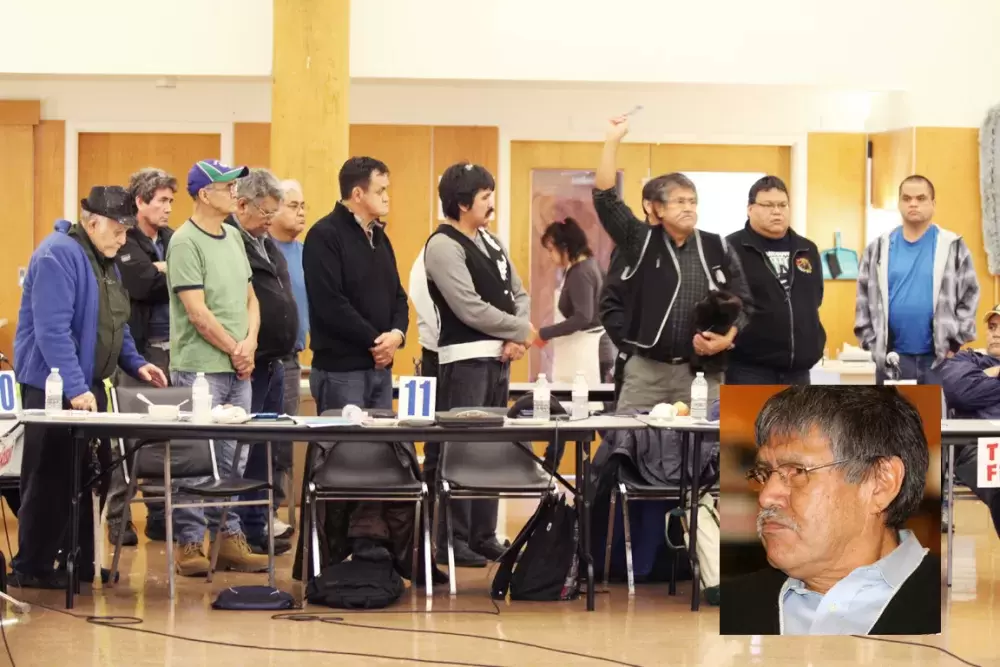Ahousaht Tyee Ha’wilth Maquinna Lewis George stood with his delegation at the Council of Ha’wiih meeting at the House of Gathering Feb. 8 to declare a trade would be done with the Uchucklesaht Tribe.
And in the process he laid down the law with the Department of Fisheries and Oceans, whose representatives were in attendance.
Maquinna said traditional protocols would rule dealings between Nuu-chah-nulth nations, not DFO’s phantom adjacency policy.
Maquinna promised that two otter pelts from his ha’houlthee (chiefly territories) would go to Uchucklesaht for the regalia of their ha’wiih (hereditary chiefs). In return, Ahousaht will get 200 sockeye this summer to feed Maquinna’s people.
Uchucklesaht’s head chief Clifford Charles stood with Ha’wilth Tom Rush to exchange tokens to secure the deal, forged with respect between the two nations, said Maquinna.
“We want to show the other ha’wiih that we have no adjacency policy, period,” Maquinna said. “There is no such thing in our territories.”
DFO’s so-called adjacency policy has been a matter of much consternation for BC First Nations. They refer to it as a phantom policy because DFO has yet to produce it in writing, though it has in recent years been used to determine where a nation can fish for its food and ceremonial needs.
DFO’s adjacency restrictions limit First Nations fishing to areas where the department says a nation’s traditional fishing areas are. But when fish producing systems are damaged and fish can’t be caught in “traditional fishing areas” Nuu-chah-nulth nations have traditionally used protocol agreements between nations to trade or barter fish from the ha-houlthees of other ha’wiih.
What DFO has been doing with these trades, however, is reducing the nation’s allotment for its own food fish needs by the amount that is traded to the other nation.
Maquinna said that would not happen in the case of Uchucklesaht.
“Pay close attention, Department of Fisheries and Oceans,” Maquinna said. “Take this back to your Prime Minister, because he needs to hear this.
“We want you to know, Uchucklesaht, that the 200 fish that we get from you that you are going to have 200 more fish in your territories to replace that without having those folks over there saying ‘We’ve got to take 200 fish off of (Uchucklesaht’s) quota. No, no, no, no. We don’t agree with that adjacency policy. We never did. Nobody consulted with us.’”
DFO’s adjacency issues have frustrated West Coast first nations for the last number of years, and the nations have been pushing back against the restrictions, telling DFO it’s not the Nuu-chah-nulth way of doing business.
Nuu-chah-nulth Tribal Council President Cliff Atleo told DFO that Nuu-chah-nulth nations have strong feelings on home use and the roadblocks that have thrown up to limit access to home use.
He reminded DFO that the food fishery priority is second only to conservation.
“And still we struggle because we are handcuffed because of your policies slowly pushing our people ashore… It is very clear that you choose not to listen to what we say,” Atleo said.
DFO representative Gerry Kelly said he agreed with the priority of conservation first and the food fishery next and he acknowledged the frustration he was hearing about access. Last October when DFO met with the Nuu-chah-nulth about the need to work together, Kelly proposed yet another meeting, without addressing the concerns expressed by the Ha’wiih at the meeting he was attending, or the meeting that Kelly had attended last June.
At the Feb. 8 meeting, again Kelly recommended having another meeting about it.
Uu-a-thluk Fisheries Manager Don Hall said “You come to this meeting saying we need to have another meeting… What don’t you understand about what Cliff just said and what the nations have been telling you for years?”
Hall said “We aren’t even going around in circles… We are stuck on the same spot.” Hall had talked the day before with the ha’wiih about a response to DFO if the department asked for another meeting.
“The reaction is aaahhhhh,” Atleo screamed in frustration.
Angus Campbell said he keeps hearing of the adjacency policy and told DFO he’d like to see a copy of it. He said the protocols between Nuu-chah-nulth nations are in place and the reason why Ahousaht has to go outside of its territory is “because our systems are buggered.”
He said the sports fishery has more rights than he, as a Nuu-chah-nulth-aht. A recreational fisherman can spend $50 on fishing license and fish anywhere in B.C., catch four to eight fish a day, depending on the rules laid out by DFO’s management of a run.
Hesquiaht members last year got six fish each for the season for their food allotment. People complain that’s not giving the food fishery priority.
Campbell complained that the DFO representatives are coming to the table without any authority.
Kiista Keith Atleo agreed.
The DFO representatives that sit with the Nuu-chah-nulth have to go back to people in Vancouver with the recommendations hashed out around the table, and those people have to go to Ottawa to consult people there.
“Your system is flawed… someone from Saskatchewan is making decisions for us on the West Coast. Somebody on the East Coast is telling us how to fish on the West Coast… It’s this process that has somebody making decisions and they don’t even have to step on a boat,” Kiista said.
Campbell said “If you want to play the game and have another meeting, realize the ball is in your court, the pitcher is you. If you don’t pitch, the game doesn’t start… We can’t start the game because you won’t pitch the ball. Let’s play the game.”
Huu-ay-aht Ha’wilth Jeff Cook also was frustrated, saying he wanted to be assured that if another meeting was called that something would be accomplished.
“My time is valuable,” he said.







